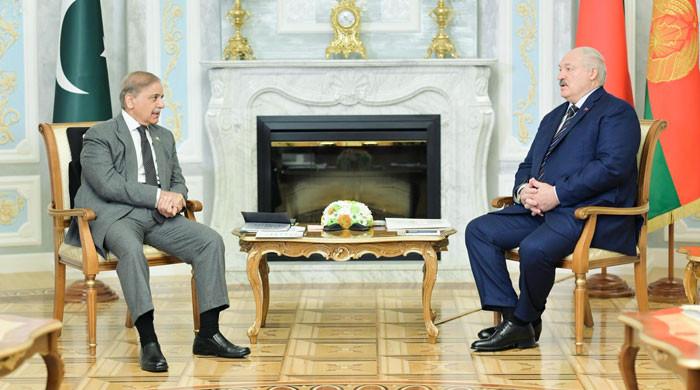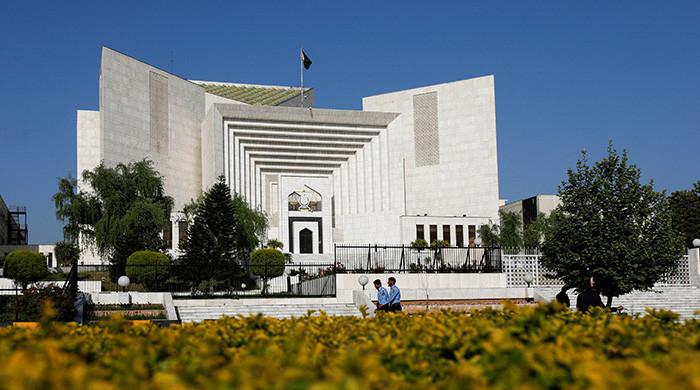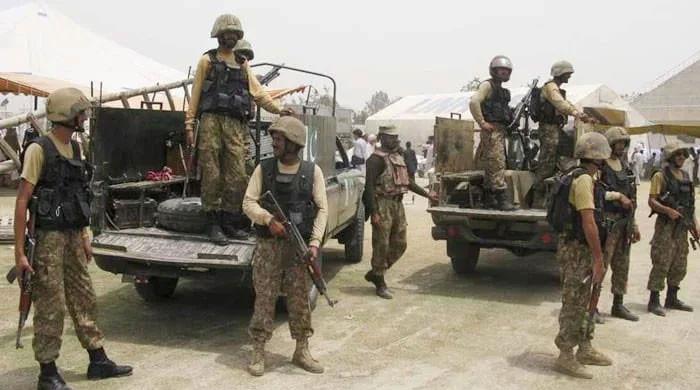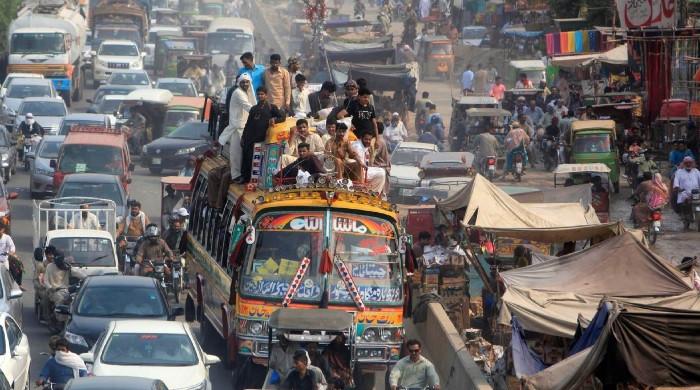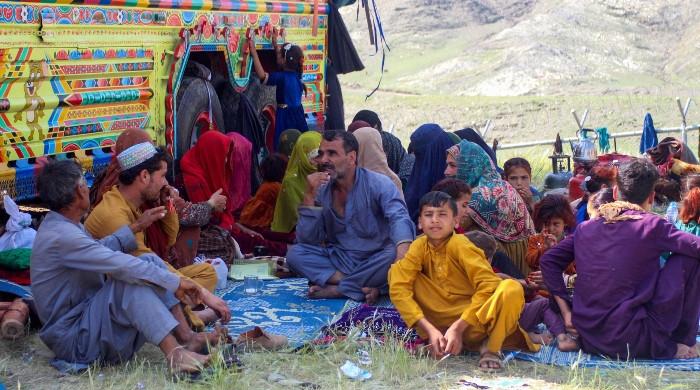Sugar crisis report shows that 'businessmen in politics will put business first': Shahzad Akbar
Shehbaz Sharif's mills did "double reporting" and Jahangir Tareen's mills guilty for "over-invoicing" as well as "corporate fraud", says Shahzad Akbar
May 21, 2020
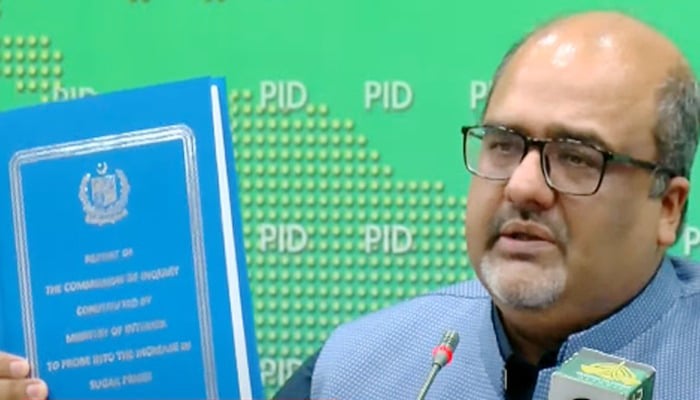
Shahzad Akbar, the premier's aide on accountability, on Thursday declared the findings of the sugar crisis inquiry public and said that the report "confirms the premier's longheld view that businessmen in politics will put business first".
Addressing a press conference alongside information minister Shibli Faraz, Akbar said that today marks an important day. "Neither have investigations been conducted over matters such as these in the past, nor has any government had the courage to make the investigations public."
He said that the sugar inquiry commission was set up because there has been a cycle of sugar price increases from December 2018 to August 2019, where prices were hiked up to 33%, which, in rupee terms, translates to Rs17 per kilogramme.
"In view of the rise in prices, the premier set up a three-member inquiry committee under FIA DG Wajid Zia and which presented a detailed report to the prime minister, wherein problems associated with the sugar industry that were causing price hikes were highlighted," Akbar said.
He said that DG anti-corruption Punjab and one member each from Intelligence Bureau (IB), Inter-Services Intelligence (ISI), Security and Exchange Commission of Pakistan (SECP) and State Bank of Pakistan (SBP) were made part of the committee.
"This commission worked for a very brief period and submitted a final report to the cabinet and today, a special cabinet meeting was called.
"In the meeting, Wajid Zia, the head of commission, presented the report and then the cabinet had a detailed discussion and the cabinet was briefed on the basic points of the report and what recommendations have been included, which I'll share in a bit. I request you all to patiently listen," the premier's aide said.
He said that the report is "very detailed" and acknowledged there will be many questions, promising to answer all.
"The recommendations are supremely important since all issues in the industry have been highlighted," he said.
Akbar said that the prime minister and the Cabinet have declared the report public and it will be available on the Press Information Department (PID) website.
Addressing the media persons present, he said that he "cannot share copies because it is too detailed".
Akbar then said that he will go over the "basic points" of the report. Breaking off from what seemed like the start of a briefing on the findings, the aide paused to say: "The prime minister in his 22 year struggle has reiterated one thing over and over, which is that when a person doing business comes into politics, then they would do business in politics as well. At the expense of the public."
"You can see clearly in this report how a business group has captured this whole industry and that includes institutional capture, regulatory capture, and it has paralysed the entire system and put the ultimate burden on the people," he said.
Six big players
Listing shares of the six major parties in the sugar industry, Akbar said JDW has 20% (the biggest share), RYK 12%, Al Moiz Group 6.8%, Tanliawal Group 5%, Sharifs Group 4.5% and Omni Group 1.6%.
He said with a 51% share of the sugar industry, they were acting as a ''cartel''.
He named in particular Shehbaz Sharif's family, Jahangir Tareen, Khusro Bakhtiar and Moonis Elahi while discussing the findings.
Akbar said the Al-Arabiya Sugar Mills owned by Salman Shehbaz Sharif was also audited, which found to be involved in "a fraud of Rs400 million through informal receipts and market manipulation".
He said that the company engaged in "double reporting".
In 2017-18, the company raked in additional profits of Rs1.3bn and when 2018-19, they earned Rs780 million.
Akbar said the JDW Sugar Mills in which Jahangir Tareen owns 21% shares, were found guilty of "double billing" and "over-invoicing" as well as "corporate fraud".
It under-invoiced sales from bagasse and molasses, which resulted in 25% cost inflation, said the premier's aide.
The mill was "involved in forward sales, satta and benami sales", Akbar said.
Speaking of Khusro Bakhtiar's brother, he said that Omar Shehryar is the one who owns a sugar mill and does not hold political office. "We cannot ask Khusro Bakhtiar to resign from his post (as minister for food security). An inquiry will be initiated against whoever is directly involved."
He said the audit of Alliance Sugar Mill from Rahim Yar Khan, in which Pakistan Muslim League- Quaid (PML-Q) senior leader Moonis Elahi has a 34% stake, showed that between 2014 to 2018, it made a systematic cut of 11% to 14% of the amount it owed to the farmers, which translated to Rs970 million.
It was was a huge blow for the farmers.
The said mill under-reported its sales for several years and sold sugar to unnamed buyers, he said, adding the inquiry report mentioned violations of the Pakistan Penal Code committed by the mills.
Akbar said a subsidy of Rs29bn was given to the sugar industry in the last five years and the total income tax of around 88 sugar mills of the country is Rs10bn, after getting a tax refund.
'Shocking findings'
Akbar said that the report "has some very shocking findings", from sugarcane procurement and sugar manufacturing to sale and exports.
Farmer consistently looted
"The first finding which is important in this report is that the farmer, the person who grows sugarcane, was consistently harmed and was looted. Sugar mills systematically paid extremely low prices, lower than even the support prices [to farmers]," Akbar said.
He said that with a support price set by the government at Rs190, the farmers were only paid Rs140 all through 2019.
The premier's aide said almost all mills cut down sugarcane weight by 15-30%, which directly impacts the farmers, because by purposefully weighing it lower, the gain goes to the sugar mill owners.
The aide also said that it was found that some mills had a system whereby rough receipts were used. "Instead of a CPR (computerised payment receipt), farmers are given unofficial receipts which are lower than Rs140."
He said that while purchasing, commission agents are used (as middlemen) which allows for sugarcane to be purchased from farmers at an even lower price.
Akbar explained that sugarcane is bought from the farmers on lower prices and the cost is presented higher while recording cost of production.
"This is the most important factor because mill owners show cost of production as higher than support price when, in reality, the commission has obtained evidence through the forensic audit which shows sugarcane is purchased on lower prices and farmers are paid lower prices," he said.
"It is also observed that mill owners engage in unofficial banking with farmers wherein they (mill owners) give advance money to farmers under the category of fertiliser, and in the category, since it is not regulated banking, up to 35% profits are received," Akbar added.
Manipulated cost of production
"A major finding is manipulation in cost. Ex mill cost, which is the cost of production was a major point determined by the commission.
"According to the report, there has never been an independent assessment of cost of production of 1 kilogramme of sugar ever before today," he said.
He said it was determined that since forever, government institutions rely on the estimate given by the Pakistan Sugarmills Association, whereas it is the responsibility of the government institutions and regulators to determine how much it costs to produce a kilogramme of sugar.
Akbar said a clear difference has been observed in what the commission counted as cost of production and what figures the sugarmill association provided.
"I'll provide the figures from the past 3 years presented in the commission report and you can understand," Akbar said.
"It's the cost of production on the basis of ex mill price — it doesn't include the tax — so the cost of production for 2017-18 provided by the sugar mills now and in the past is Rs51 per kilogramme, whereas the forensic audit commission determined this as Rs38, a difference of Rs13.
"Similarly, the cost of production for 2018-19 determined by the sugar mills association — which is not done independently but done by mills themselves — was Rs52.06, whereas the forensic audit commission determined it as Rs40.06. This shows a difference of more than Rs12."
He said that in 2019-20 sugar mill price determination before taxation is Rs62, whereas the price determined by commission is Rs40.04 — a very clear difference.
He said the commission found ‘over-invoicing of sugarcane procurement’ — that sugarcane is being purchased on lower price and shown in the books at a higher price.
Furthermore, the cost of by-products — two major by-products are bagasse and molasses — are recorded lower than actual.
“So when the sugar commission determined costs properly according to market rates, a difference was seen in the cost of production.”
Sindh's subsidy on exports benefitted Omni Group
He said that the commission also evaluated in the forensic audit how much subsidy was given to mills for exports.
Akbar said "gross injustice" had been committed in Sindh whereby the subsidy "was tailored to benefit Omni Group".
He said this year’s subsidy from Sindh worth Rs9.3bn was given “to all mills” versus a first come, first-served basis. He said this way the company with the biggest share in Sindh, Omni Group, benefitted.
The aide questioned how Chief Minister Sindh Murad Ali Shah approved this.





